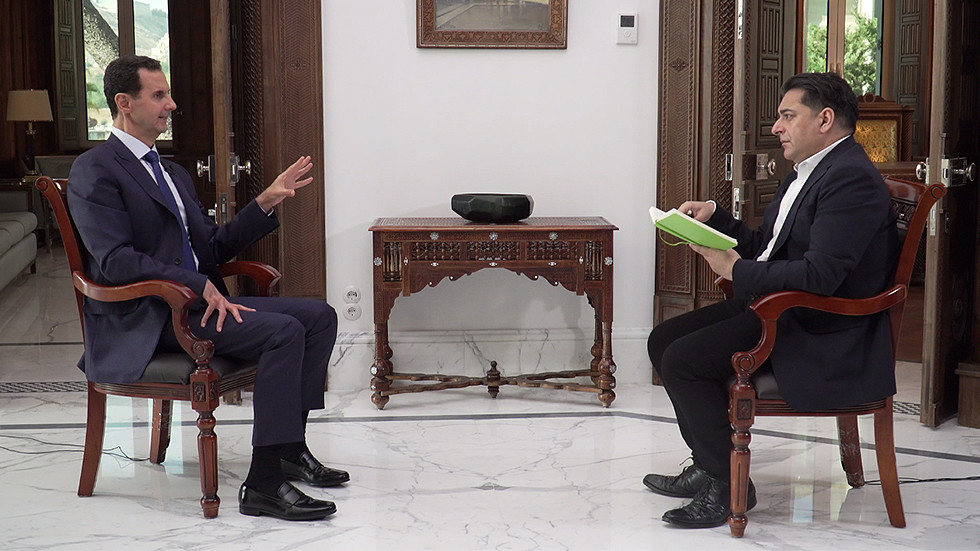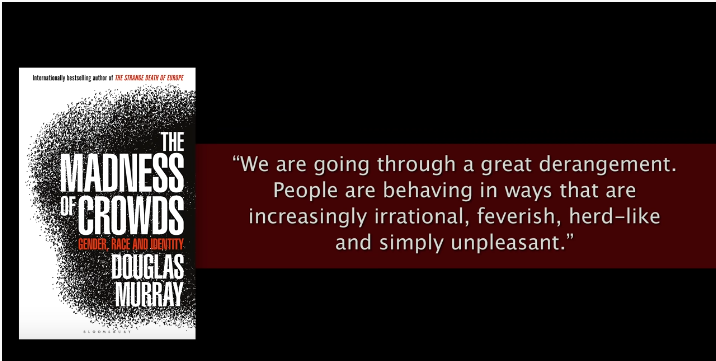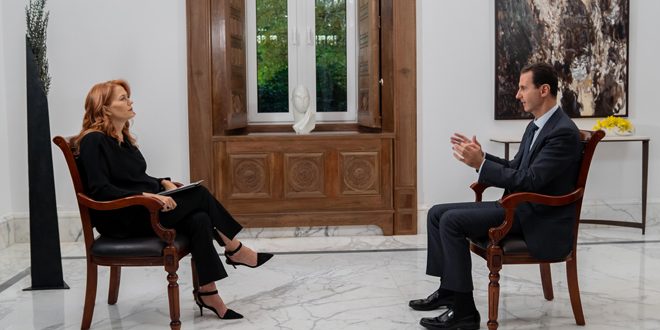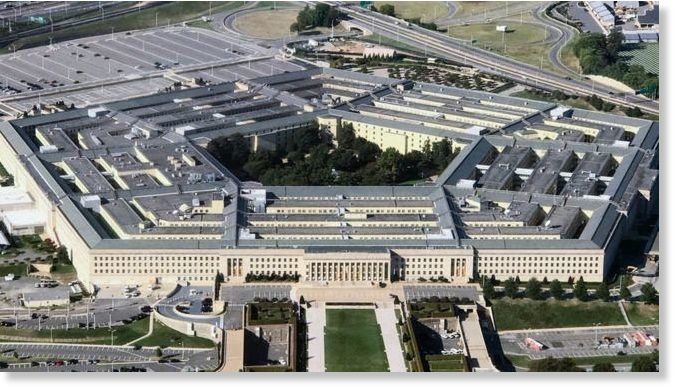The interview that Italian Rai News 24 refrained from broadcasting…President al-Assad: Europe was the main player in creating chaos in Syria-video
9 December، 2019
Damascus, SANA-President Bashar al-Assad said that Syria is going to come out of the war stronger and the future of Syria is promising and the situation is much better, pointing out to the achievements of the Syrian Arab army in the war against terrorism.
The President, in an interview given to Italian Rai News 24 TV on November 26,2019 and was expected to be broadcast on December 2nd and the Italian TV
refrained from broadcasting itfor non-understandable reasons, added that Europe was the main player in creating chaos in Syria and the problem of refugees in it was because of its direct support to terrorism along with the US, Turkey and many other countries.
President al-Assad stressed that since the beginning of the narrative regarding the chemical weapons, Syria has affirmed it didn’t use them.
The President affirmed that what the OPCW organization did was to fake and falsify the report about using chemical weapons, just because the Americans wanted them to do so. So, fortunately, this report proved that everything we said during the last few years, since 2013, is correct.
Following is the full text of the interview;
Question 1: Mr. President, thanks for having us here. Let us know please, what’s the situation in Syria now, what’s the situation on the ground, what is happening in the country?
President Assad: If we want to talk about Syrian society: the situation is much, much better, as we learned so many lessons from this war and I think the future of Syria is promising; we are going to come out of this war stronger.
Talking about the situation on the ground: The Syrian Army has been advancing for the last few years and has liberated many areas from the terrorists, there still remains Idleb where you have al-Nusra that’s being supported by the Turks, and you have the northern part of Syria where the Turks have invaded our territory last month.
So, regarding the political situation, you can say it’s becoming much more complicated, because you have many more players that are involved in the Syrian conflict in order to make it drag on and to turn it into a war of attrition.
Question 2: When you speak about liberating, we know that there is a military vision on that, but the point is: how is the situation now for the people that decided to be back in society? The process of reconciliation, now at what point? Is it working or not?
President Assad: Actually, the methodology that we adopted when we wanted to create let’s say, a good atmosphere – we called it reconciliation, for the people to live together, and for those people who lived outside the control of government areas to go back to the order of law and institutions. It was to give amnesty to anyone, who gives up his armament and obey the law. The situation is not complicated regarding this issue, if you have the chance to visit any area, you’ll see that life is getting back to normal.
The problem wasn’t people fighting with each other; it wasn’t like the Western narrative may have tried to show – as Syrians fighting with each other, or as they call it a “civil war,” which is misleading. The situation was terrorists taking control of areas, and implementing their rules. When you don’t have those terrorists, people will go back to their normal life and live with each other. There was no sectarian war, there was no ethnical war, there was no political war; it was terrorists supported by outside powers, they have money and armaments, and they occupy those areas.
Question 3: Aren’t you afraid that this kind of ideology that took place and, you know, was the basis of everyday life for people for so many years, in some ways can stay in the society and sooner or later will be back?
President Assad: This is one of the main challenges that we’ve been facing. What you’re asking about is very correct. You have two problems. Those areas that were out of the control of government were ruled by two things: chaos, because there is no law, so people – especially the younger generation – know nothing about the state and law and institutions.
The second thing, which is deeply rooted in the minds, is the ideology, the dark ideology, the Wahabi ideology – ISIS or al-Nusra or Ahrar al-Cham, or whatever kind of these Islamist terrorist extremist ideologies.
Now we have started dealing with this reality, because when you liberate an area you have to solve this problem otherwise what’s the meaning of liberating? The first part of the solution is religious, because this ideology is a religious ideology, and the Syrian religious clerics, or let’s say the religious institution in Syria, is making a very strong effort in this regard, and they have succeeded; they succeeded at helping those people understanding the real religion, not the religion that they’ve been taught by al-Nusra or ISIS or other factions.
Question 4: So basically, clerics and mosques are part of this reconciliation process?
President Assad: This is the most important part. The second part is the schools. In schools, you have teachers, you have education, and you have the national curriculum, and this curriculum is very important to change the minds of those young generations. Third, you have the culture, you have the role of arts, intellectuals, and so on. In some areas, it’s still difficult to play that role, so it was much easier for us to start with the religion, second with the schools.
Question 5: Mr. President, let me just go back to politics for an instant. You mentioned Turkey, okay? Russia has been your best ally these years, it’s not a secret, but now Russia is compromising with Turkey on some areas that are part of Syrian area, so how do you assess this?
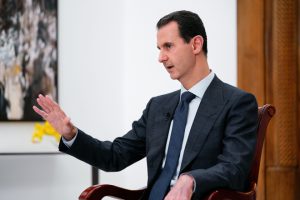 President Assad:
President Assad: To understand the Russian role, we have to understand the Russian principles. For Russia, they believe that international law – and international order based on that law – is in the interest of Russia and in the interest of everybody in the world. So, for them, by supporting Syria they are supporting international law; this is one point. Secondly, being against the terrorists is in the interest of the Russian people and the rest of the world.
So, being with Turkey and making this compromise doesn’t mean they support the Turkish invasion; rather they wanted to play a role in order to convince the Turks that you have to leave Syria. They are not supporting the Turks, they don’t say “this is a good reality, we accept it and Syria must accept it.” No, they don’t. But because of the American negative role and the Western negative role regarding Turkey and the Kurds, the Russians stepped in, in order to balance that role, to make the situation… I wouldn’t say better, but less bad if you want to be more precise. So, in the meantime, that’s their role. In the future, their position is very clear: Syrian integrity and Syrian sovereignty. Syrian integrity and sovereignty are in contradiction with the Turkish invasion, that is very obvious and clear.
Question 6: So, you’re telling me that the Russians could compromise, but Syria is not going to compromise with Turkey. I mean, the relation is still quite tense.
President Assad: No, even the Russians didn’t make a compromise regarding the sovereignty. No, they deal with reality. Now, you have a bad reality, you have to be involved to make some… I wouldn’t say compromise because it’s not a final solution. It could be a compromise regarding the short-term situation, but in the long-term or the mid-term, Turkey should leave. There is no question about it.
Question 7: And in the long-term, any plan of discussions between you and Mr. Erdogan?
President Assad: I wouldn’t feel proud if I have to someday. I would feel disgusted to deal with those kinds of opportunistic Islamists, not Muslims, Islamists – it’s another term, it’s a political term. But again, I always say: my job is not to be happy with what I’m doing or not happy or whatever. It’s not about my feelings, it’s about the interests of Syria, so wherever our interests go, I will go.
Question 8: In this moment, when Europe looks at Syria, apart from the considerations about the country, there are two major issues: one is refugees, and the other one is the Jihadists or foreign fighters coming back to Europe. How do you see these European worries?
President Assad: We have to start with a simple question: who created this problem? Why do you have refugees in Europe? It’s a simple question: because of terrorism that’s being supported by Europe – and of course the United States and Turkey and others – but Europe was the main player in creating chaos in Syria. So, what goes around comes around.
Question 9: Why do you say it was the main player?
President Assad: Because they publicly supported, the EU supported the terrorists in Syria from day one, week one or from the very beginning. They blamed the Syrian government, and some regimes like the French regime sent armaments, they said – one of their officials – I think their Minister of Foreign Affairs, maybe Fabius said “we send.” They sent armaments; they created this chaos. That’s why a lot of people find it difficult to stay in Syria; millions of people couldn’t live here so they had to get out of Syria.
Question 10: In this moment, in the region, there are turmoil, and there is a certain chaos. One of the other allies of Syria is Iran, and the situation there is getting complicated. Does it have any reflection on the situation in Syria?
President Assad: Definitely, whenever you have chaos, it’s going to be bad for everyone, it’s going to have side-effects and repercussions, especially when there is external interference. If it’s spontaneous, if you talk about demonstrations and people asking for reform or for a better situation economically or any other rights, that’s positive. But when it’s for vandalism and destroying and killing and interfering from outside powers, then no – it’s definitely nothing but negative, nothing but bad, and a danger on everyone in this region.
Question 11: Are you worried about what’s happening in Lebanon, which is really the real neighbor?
President Assad: Yes, in the same way. Of course, Lebanon would affect Syria more than any other country because it is our direct neighbor. But again, if it’s spontaneous and it’s about reform and getting rid of the sectarian political system, that would be good for Lebanon. Again, that depends on the awareness of the Lebanese people in order not to allow anyone from the outside to try to manipulate the spontaneous movement or demonstrations in Lebanon.
Question 12: Let’s go back to what is happening in Syria. In June, Pope Francis wrote you a letter asking you to pay attention and to respect the population, especially in Idleb where the situation is still very tense, because there is fighting there, and when it comes even to the way prisoners are treated in jails. Did you answer him, and what did you answer?
President Assad: The letter of the Pope was about his worry for civilians in Syria and I had the impression that maybe the picture in the Vatican is not complete. That’s to be expected, since the mainstream narrative in the West is about this “bad government” killing the “good people;” as you see and hear in the same media – every bullet of the Syrian Army and every bomb only kills civilians and only hospitals! they don’t kill terrorists as they target those civilians! which is not correct.
So, I responded with a letter explaining to the Pope the reality in Syria – as we are the most, or the first to be concerned about civilian lives, because you cannot liberate an area while the people are against you. You cannot talk about liberation while the civilians are against you or the society. The most crucial part in liberating any area militarily is to have the support of the public in that area or in the region in general. That has been clear for the last nine years and that’s against our interests.
Question 13: But that kind of call, in some ways, made you also think again about the importance of protecting civilians and people of your country.
President Assad: No, this is something we think about every day, not only as morals, principles and values but as interests. As I just mentioned, without this support – without public support, you cannot achieve anything… you cannot advance politically, militarily, economically and in every aspect. We couldn’t withstand this war for nine years without the public support and you cannot have public support while you’re killing civilians. This is an equation, this is a self-evident equation, nobody can refute it. So, that’s why I said, regardless of this letter, this is our concern.
But again, the Vatican is a state, and we think that the role of any state – if they worry about those civilians, is to go to the main reason.
The main reason is the Western role in supporting the terrorists, and it is the sanctions on the Syrian people that have made the situation much worse – and this is another reason for the refugees that you have in Europe now. You don’t want refugees but at the same time you create the situation or the atmosphere that will tell them “go outside Syria, somewhere else,” and of course they will go to Europe. So, this state, or any state, should deal with the reasons and we hope the Vatican can play that role within Europe and around the world; to convince many states that you should stop meddling in the Syrian issue, stop breaching international law. That’s enough, we only need people to follow international law. The civilians will be safe, the order will be back, everything will be fine. Nothing else.
Question 14: Mr. President, you’ve been accused several times of using chemical weapons, and this has been the instrument of many decisions and a key point, the red line, for many decisions. One year ago, more than one year ago, there has been the Douma event that has been considered another red line. After that, there has been bombings, and it could it have been even worse, but something stopped. These days, through WikiLeaks, it’s coming out that something wrong in the report could have taken place. So, nobody yet is be able to say what has happened, but something wrong in reporting what has happened could have taken place.
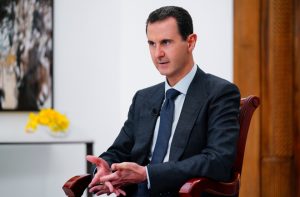 President Assad:
President Assad: We have always – since the beginning of this narrative regarding the chemical weapons – we have said that we didn’t use it; we cannot use it, it’s impossible to be used in our situation for many reasons, let’s say – logistical reasons.
Intervention: Give me one.
President Assad: One reason, a very simple one: when you’re advancing, why would you use chemical weapons?! We are advancing, why do we need to use it?! We are in a very good situation so why use it, especially in 2018? This is one reason.
Second, very concrete evidence that refutes this narrative: when you use chemical weapons – this is a weapon of mass destruction, you talk about thousands of dead or at least hundreds. That never happened, never – you only have these videos of staged chemical weapons attacks. In the recent report that you’ve mentioned, there’s a mismatch between what we saw in the video and what they saw as technicians or as experts. The amount of chlorine that they’ve been talking about: first of all, chlorine is not a mass destruction material, second, the amount that they found is the same amount that you can have in your house, it exists in many households and used maybe for cleaning and whatever. The same amount exactly. That’s what the OPCW organisation did – they faked and falsified the report, just because the Americans wanted them to do so. So, fortunately, this report proved that everything we said during the last few years, since 2013, is correct. We were right, they were wrong. This is proof, this is concrete proof regarding this issue. So, again, the OPCW is biased, is being politicized and is being immoral, and those organisations that should work in parallel with the United Nations to create more stability around the world – they’ve been used as American arms and Western arms to create more chaos.
Question 15: Mr. President, after nine years of war, you are speaking about the mistakes of the others. I would like you to speak about your own mistakes, if any. Is there something you would have done in a different way, and which is the lesson learned that can help your country?
President Assad: Definitely, for when you talk about doing anything, you always find mistakes; this is human nature. But when you talk about political practice, you have two things: you have strategies or big decisions, and you have tactics – or in this context, the implementation. So, our strategic decisions or main decisions were to stand against terrorism, to make reconciliation and to stand against the external meddling in our affairs. Today, after nine years, we still adopt the same policy; we are more adherent to this policy. If we thought it was wrong, we would have changed it; actually no, we don’t think there is anything wrong in this policy. We did our mission; we implemented the constitution by protecting the people.
Now, if you talk about mistakes in implementation, of course you have so many mistakes. I think if you want to talk about the mistakes regarding this war, we shouldn’t talk about the decisions taken during the war because the war – or part of it, is a result of something before.
Two things we faced during this war: the first one was extremism. The extremism started in this region in the late 60s and accelerated in the 80s, especially the Wahabi ideology.
If you want to talk about mistakes in dealing with this issue: then yes, I will say we were very tolerant of something very dangerous. This is a big mistake we committed over decades; I’m talking about different governments, including myself before this war.
The second one, when you have people who are ready to revolt against the order, to destroy public properties, to commit vandalism and so on, they work against their country, they are ready to go and work for foreign powers – foreign intelligence, they ask for external military interference against their country. So, this is another question: how did we have those?
If you ask me how, I would tell you that before the war we had more than 50,000 outlaws that weren’t captured by the police for example; for those outlaws, their natural enemy is the government because they don’t want to go to prison.
Question 16: And how about also the economic situation? Because part of it – I don’t know if it was a big or small part of it – but part of it has also been the discontent and the problems of population in certain areas in which economy was not working. Is it a lesson learned somewhere?
President Assad: It could be a factor, but definitely not a main factor. Some people talk about the four years of drought that pushed the people to leave their land in the rural areas to go to the city… it could be a problem, but this is not the main problem. They talked about the liberal policy… we didn’t have a liberal policy, we’re still socialist, we still have a public sector – a very big public sector in government. You cannot talk about liberal policy while you have a big public sector. We had growth, good growth.
Of course, in the implementation of our policy, again, you have mistakes. How can you create equal opportunities between people? Between rural areas and between the cities? When you open up the economy, the cities will benefit more, that will create more immigration from rural areas to the cities… these are factors, that could play some role, but this is not the issue. In the rural areas where you have more poverty, the money of the Qataris played a more actual role than in the cities, that’s natural. You pay them in half an hour what they get in one week; that’s very good for them.
Question 17: We are almost there, but there are two more questions that I want to ask you. One is about reconstruction, and reconstruction is going to be very costly. How can you imagine to afford this reconstruction, who could be your allies in reconstruction?
President Assad: We don’t have a big problem with that. Talking that Syria has no money… no, actually Syrians have a lot of money; the Syrian people around the world have a lot of money, and they want to come and build their country. Because when you talk about building the country, it is not giving money to the people, it’s about getting benefit – it’s a business. So, many people, not only Syrians, want to do business in Syria. So, talking about where you can have funds for this reconstruction, we already have, but the problem is that these sanctions prevent those businessmen or companies from coming and working in Syria. In spite of that, we started and in spite of that, some foreign companies have started finding ways to evade these sanctions and we have started planning. It’s going to be slow, without the sanctions we wouldn’t have a problem with funding.
Question 18: Ending on a very personal note, Mr. President; do you feel like a survivor?
President Assad: If you want to talk about a national war like this, where nearly every city has been harmed by terrorism or external bombardment and other things, then you can talk about all the Syrians as survivors. I think this is human nature: to be a survivor.
Intervention: And you yourself?
President Assad: I’m a part of those Syrians. I cannot be disconnected from them; I have the same feeling. Again, it’s not about being a strong person who is a survivor. If you don’t have this atmosphere, this society, or this incubator to survive, you cannot survive. It’s collective; it’s not a single person, it’s not a one-man show.
Journalist: Thank you very much, Mr. President.
President Assad: Thank you.


